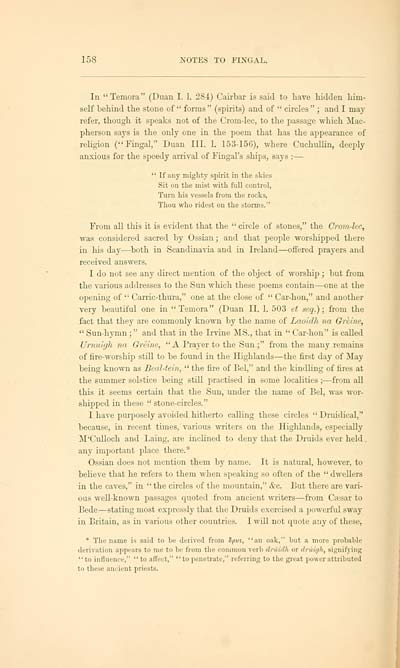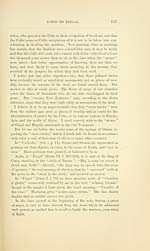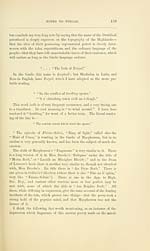Ossian Collection > Poems of Ossian > Volume 2
(168)
Download files
Complete book:
Individual page:
Thumbnail gallery: Grid view | List view

158 NOTES TO FINGAL.
In " Temora " (Duan I. 1. 284) Cairbar is said to liave bidden bim-
self bebind tbe stone of " forms " (spirits) and of " circles " ; and I may
refer, tbough it speaks not of tbe Crom-lec, to tbe passage wbicb Mac-
pherson saj's is tbe only one in tbe poem tbat bas tbe appearance of
religion ("Fingal," Duan III. 1. 153-156), wbere Cucbullin, deejjly
anxious for tbe speedy arrival of Fingal's sbips, says : —
" If any niightv spirit in the skies
Sit ou the mist with full control,
Tarn his vessels from the rocks.
Thou who ridcst ou the storms.''
From all tliis it is evident that the " circle of stones," tbe Crom-lec,
was considered sacred by Ossian ; and tbat people worshipped there
in bis day — both in Scandinavia and in Ircland^ofifered prayers and
received answers.
I do not see any direct montiuu of tbe object of worship ; but from
the various addresses to tbe Sun which these poems contain — one at the
opening of " Carric-thura," one at the close of " Car-bon," and another
very beautiful one in "Temora" (Duan II. 1. 503 et scq.) ; from the
fact tbat they are commonly known by tbe name of Laoidh na Grline,
" Sun-hymn ; " and tbat in the Irvine MS., that in " Car-bon" is called
Urnidgh nn Grùine, "A Prayer to the Sun.;" from the many remains
of fire-worship still to be found in the Highlands — tbe first day of May
being known as Beal-tein, " tbe fire of Bel," and the kindling of fires at
the summer solstice being still practised in some localities ; — from aU
this it seems certain tbat the Sun, under the name of Bel, was wor-
shipped in these " stone-circles."
I have purposely avoided hitherto calling these circles " Druidical,"
because, in recent times,' variotis writers on tbe Higldands, especially
M'Culloch and Laing, are incbned to deny tbat tbe Druids ever held ,
any important place there.*
Ossian does not mention them by name. It is natural, however, to
believe tbat be refers to them when speaking so often of the " dwellers
in the caves," in "the circles of the mountain," etc. But there are vari-
ous well-known passages quoted from ancient writers — from Caesar to
Bede — stating most cxjiressly tliat the Druids exercised a powerful sway
in Britain, as in various other countries. I will not quote any of these,
* The name is said to bo derived from Spuf, "an oak," but a more probable
derivation appears to me to be from the eoniniou verb dniidh or drùigh, si;;nifyin>;
" to influence," "to alTect," "to penetrate," referring to the great power attributed
to these ancient priests.
In " Temora " (Duan I. 1. 284) Cairbar is said to liave bidden bim-
self bebind tbe stone of " forms " (spirits) and of " circles " ; and I may
refer, tbough it speaks not of tbe Crom-lec, to tbe passage wbicb Mac-
pherson saj's is tbe only one in tbe poem tbat bas tbe appearance of
religion ("Fingal," Duan III. 1. 153-156), wbere Cucbullin, deejjly
anxious for tbe speedy arrival of Fingal's sbips, says : —
" If any niightv spirit in the skies
Sit ou the mist with full control,
Tarn his vessels from the rocks.
Thou who ridcst ou the storms.''
From all tliis it is evident that the " circle of stones," tbe Crom-lec,
was considered sacred by Ossian ; and tbat people worshipped there
in bis day — both in Scandinavia and in Ircland^ofifered prayers and
received answers.
I do not see any direct montiuu of tbe object of worship ; but from
the various addresses to tbe Sun which these poems contain — one at the
opening of " Carric-thura," one at the close of " Car-bon," and another
very beautiful one in "Temora" (Duan II. 1. 503 et scq.) ; from the
fact tbat they are commonly known by tbe name of Laoidh na Grline,
" Sun-hymn ; " and tbat in the Irvine MS., that in " Car-bon" is called
Urnidgh nn Grùine, "A Prayer to the Sun.;" from the many remains
of fire-worship still to be found in the Highlands — tbe first day of May
being known as Beal-tein, " tbe fire of Bel," and the kindling of fires at
the summer solstice being still practised in some localities ; — from aU
this it seems certain tbat the Sun, under the name of Bel, was wor-
shipped in these " stone-circles."
I have purposely avoided hitherto calling these circles " Druidical,"
because, in recent times,' variotis writers on tbe Higldands, especially
M'Culloch and Laing, are incbned to deny tbat tbe Druids ever held ,
any important place there.*
Ossian does not mention them by name. It is natural, however, to
believe tbat be refers to them when speaking so often of the " dwellers
in the caves," in "the circles of the mountain," etc. But there are vari-
ous well-known passages quoted from ancient writers — from Caesar to
Bede — stating most cxjiressly tliat the Druids exercised a powerful sway
in Britain, as in various other countries. I will not quote any of these,
* The name is said to bo derived from Spuf, "an oak," but a more probable
derivation appears to me to be from the eoniniou verb dniidh or drùigh, si;;nifyin>;
" to influence," "to alTect," "to penetrate," referring to the great power attributed
to these ancient priests.
Set display mode to: Large image | Transcription
Images and transcriptions on this page, including medium image downloads, may be used under the Creative Commons Attribution 4.0 International Licence unless otherwise stated. ![]()
| Early Gaelic Book Collections > Ossian Collection > Poems of Ossian > Volume 2 > (168) |
|---|
| Permanent URL | https://digital.nls.uk/77870404 |
|---|
| Description | Volume II of 'Poems of Ossian : in the original Gaelic with a literal translation into English and a dissertation on the authenticity of the poems / by the Archibald Clerk ; together with the English translation by Macpherson'. |
|---|---|
| Shelfmark | Oss.136 |
| Additional NLS resources: | |
| Attribution and copyright: |
|
| Description | Selected books from the Ossian Collection of 327 volumes, originally assembled by J. Norman Methven of Perth. Different editions and translations of James MacPherson's epic poem 'Ossian', some with a map of the 'Kingdom of Connor'. Also secondary material relating to Ossianic poetry and the Ossian controversy. |
|---|
| Description | Selected items from five 'Special and Named Printed Collections'. Includes books in Gaelic and other Celtic languages, works about the Gaels, their languages, literature, culture and history. |
|---|

